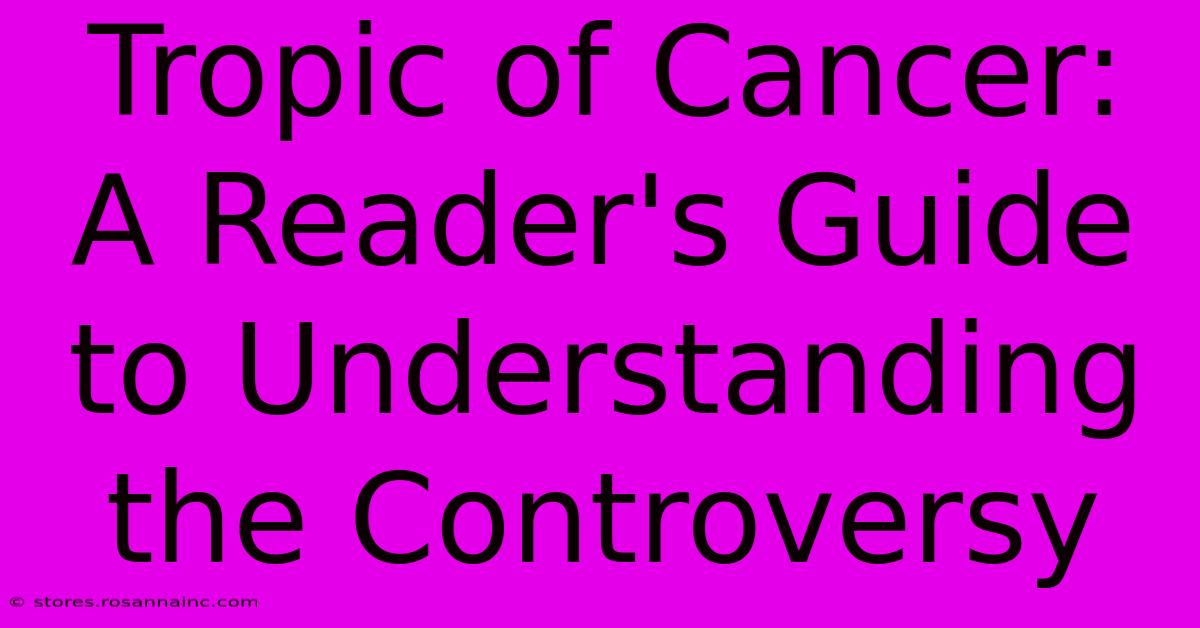Tropic Of Cancer: A Reader's Guide To Understanding The Controversy

Table of Contents
Tropic of Cancer: A Reader's Guide to Understanding the Controversy
Henry Miller's Tropic of Cancer, first published in 1934, remains a potent and controversial work of literature. Its unflinching portrayal of sex, poverty, and bohemian life in 1930s Paris shocked readers and led to its ban in several countries for decades. This guide aims to help readers navigate the complexities of the novel and understand the reasons behind its enduring controversy.
Understanding the Novel's Controversial Content
The primary source of Tropic of Cancer's controversy stems from its explicit depictions of sexuality and its frank language. Miller doesn't shy away from graphic descriptions of sexual encounters, prostitution, and bodily functions. This raw honesty was, and to some extent still is, considered taboo by many. But the controversy extends beyond mere nudity.
Beyond the Sex: Themes of Poverty and Alienation
While the explicit sexual content is undeniable, reducing Tropic of Cancer to mere pornography significantly misunderstands its artistic merit. The novel explores themes of poverty, alienation, and the search for meaning in a seemingly meaningless world. Miller's portrayal of life in Paris's impoverished underbelly is unflinching and often bleak. The characters are often struggling with hunger, loneliness, and a profound sense of displacement.
The Role of Stream of Consciousness and Experimental Style
Miller's experimental style, characterized by stream-of-consciousness narration and a non-linear structure, further contributes to the novel's complexity and controversiality. This unconventional approach challenges traditional narrative expectations, making the reading experience both jarring and rewarding. The fragmented nature of the narrative mirrors the fragmented state of the protagonist's mind and the chaotic world he inhabits. This stylistic choice, coupled with the explicit content, alienated some readers and added to the book's reputation for being scandalous.
The Censorship and Legal Battles
The novel's explicit content resulted in its censorship and subsequent legal battles. For many years, it was banned in the United States, deemed obscene by various courts. These legal challenges became crucial in shaping the landscape of literary freedom and obscenity laws. The Supreme Court eventually overturned the ban, paving the way for a wider discussion on artistic expression and freedom of speech. The years of censorship only fueled interest in the book, making it a symbol of rebellion and artistic freedom.
Analyzing the Impact of Censorship on Literary Discourse
The censorship of Tropic of Cancer had a profound impact on literary discourse. It ignited debates about the boundaries of artistic expression, obscenity laws, and the role of literature in challenging societal norms. The legal battles surrounding its publication contributed significantly to the development of First Amendment jurisprudence, particularly concerning freedom of expression.
Approaching Tropic of Cancer as a Reader
Reading Tropic of Cancer requires a willingness to engage with uncomfortable and challenging material. The novel is not for the faint of heart. However, for readers prepared to confront its explicit content and experimental style, it offers a powerful and insightful exploration of human experience.
Understanding the Historical and Cultural Context
Understanding the historical and cultural context of the 1930s, especially the struggles of expatriate writers in Paris, is essential to fully appreciating the novel's complexities. Researching the socio-economic conditions in Paris during this period can significantly enrich your understanding of the characters' motivations and experiences.
Considering Miller's Autobiographical Elements
While a work of fiction, Tropic of Cancer draws heavily on Miller's own life and experiences. Understanding this autobiographical element adds a layer of depth and authenticity to the narrative. However, it's important to remember that the novel is not a straightforward autobiography, but rather a highly stylized and fictionalized account.
Conclusion: A Lasting Legacy of Controversy
Tropic of Cancer remains a controversial and deeply influential work of literature. Its explicit content continues to provoke debate, while its exploration of poverty, alienation, and the human condition remains relevant and thought-provoking. By understanding the novel's historical context, literary style, and the controversies surrounding it, readers can fully appreciate its enduring significance and its lasting impact on the world of literature. This guide is intended to assist readers in navigating this complex and rewarding text, encouraging critical engagement rather than simple condemnation or dismissal. It is through such critical analysis that we can better understand the power and lasting relevance of Henry Miller's controversial masterpiece.

Thank you for visiting our website wich cover about Tropic Of Cancer: A Reader's Guide To Understanding The Controversy. We hope the information provided has been useful to you. Feel free to contact us if you have any questions or need further assistance. See you next time and dont miss to bookmark.
Featured Posts
-
Jesus Jewish Heritage Why It Matters Today
Feb 09, 2025
-
Conquer Your Fears With Scooby Doos 100 Frights
Feb 09, 2025
-
Who Is John E Jones Iii And Why Should You Care
Feb 09, 2025
-
Carry A Big Stick Project Confidence And Achieve Your Goals
Feb 09, 2025
-
Discover Atwater Village Your La Oasis
Feb 09, 2025
